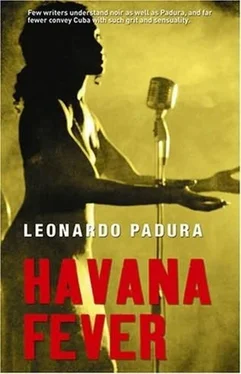Leonardo Padura - Havana Fever
Здесь есть возможность читать онлайн «Leonardo Padura - Havana Fever» весь текст электронной книги совершенно бесплатно (целиком полную версию без сокращений). В некоторых случаях можно слушать аудио, скачать через торрент в формате fb2 и присутствует краткое содержание. Жанр: Триллер, на английском языке. Описание произведения, (предисловие) а так же отзывы посетителей доступны на портале библиотеки ЛибКат.
- Название:Havana Fever
- Автор:
- Жанр:
- Год:неизвестен
- ISBN:нет данных
- Рейтинг книги:3 / 5. Голосов: 1
-
Избранное:Добавить в избранное
- Отзывы:
-
Ваша оценка:
- 60
- 1
- 2
- 3
- 4
- 5
Havana Fever: краткое содержание, описание и аннотация
Предлагаем к чтению аннотацию, описание, краткое содержание или предисловие (зависит от того, что написал сам автор книги «Havana Fever»). Если вы не нашли необходимую информацию о книге — напишите в комментариях, мы постараемся отыскать её.
Havana Fever — читать онлайн бесплатно полную книгу (весь текст) целиком
Ниже представлен текст книги, разбитый по страницам. Система сохранения места последней прочитанной страницы, позволяет с удобством читать онлайн бесплатно книгу «Havana Fever», без необходимости каждый раз заново искать на чём Вы остановились. Поставьте закладку, и сможете в любой момент перейти на страницу, на которой закончили чтение.
Интервал:
Закладка:
“You reckon they’d dare take on the police?” wondered Carlos.
“Down there, man,” interjected Yoyi, waving a finger at hidden depths under the soil, “they don’t believe in anything or anybody. And the guys not from the barrio work like the mafia. But they didn’t do you over for being police, that’s too dangerous. It was because you were being a nosey parker.”
“My problem is I need to talk to that woman soon. The world is the way it is, independent of any specific thought you might formulate about it. What that woman says will decide if I’m on the wrong path or not. I’ve meditated long and hard and I think enlightenment may be just around the corner.”
“You got a temperature?’ asked Carlos, alarmed by Conde’s florid language.
“Why the hell should she tell you something she probably doesn’t want to tell anyone?” Rabbit’s merciless logic brought the Count’s desires back to the real world.
“Because if what I think is true,” the Count went on, “Lotus Flower has lived in fear for the last forty years. And that’s too long, right?”
“True enough. But she even changed her name…” Rabbit continued to doubt.
“And when do you say you’re going?” Skinny Carlos sat back in his chair.
“Tomorrow,” asserted the Count, his vehement tone sparking off pain and bewilderment.
“I’ll go with you,” said Candito, “and don’t argue.”
“What the hell, so will I,” joined in Rabbit.
“How many pistols should I hire out?” asked Yoyi, enthused. “The rate’s dropped recently…”
“No, we’ve got to go clean,” rasped the Count,
“A couple of truncheons might come in handy,” concluded Candito, before adding: “May Jesus My Lord and Saviour forgive me.”
They left the Bel Air Chevrolet under the watchful eye of a vigilante on an hourly rate, opposite Fraternity Park, and, still limping, with one very sore eye and a bruised eyebrow covered in sticking plaster, the Count led his troops towards the Calzada de Monte and the barrio of Atarés. Candito and Pigeon, in loose fitting shirts, hid steel bars in their waistbands, which they’d use in self-defence if necessary, while Rabbit, in trembling tones, insisted on recounting the history of that eternally marginal barrio famous for its rabid inhabitants, and where it was always perilous to put a foot wrong.
When they were on the doorstep of 58, Factoría, Conde asked his friends to wait on the pavement and keep out of trouble. He apologized for the sewage flowing down the street opposite which infected the air with its stench. He overcame his lameness and walked through the door to an inner patio which opened out like a small square, where two women were trying to wash clothes white in concrete washtubs. Conde looked around for signs of danger, but imagined that at this time of the morning a necessary truce must rule after a night of non-stop hustle and bustle. Forcing a smile, he advanced on the washtubs where the women stopped wringing and turned to challenge the intruder. The Count thought his appearance could arouse curiosity rather than seem threatening. He broadened his smile as he greeted them, and asked which was the room where an elderly lady called Carmen lived. The women glanced instinctively at each other.
“No Carmen lives here,” replied the bigger of the two, a black woman with arms like soft hams.
“Yes, a Carmen does live here,” the Count insisted as a light flashed in his brain. “My friend Veneno gave me her address.”
The women exchanged more glances, but said nothing, and the Count added: “I’m not a policeman, I just want to speak to her about a relative of mine we lost track of a long time ago.”
“It’s right at the back, at the end,” said the stouter black woman, making it obvious how much she disliked giving information to a stranger.
Conde waved gratefully at them and headed to the back of the ruin, dodging wooden supports that, miraculously rather than from any feat of engineering, propped up the second-floor passageway, and poked his head round the open door of the last room. The room was four by six yards, littered with grimy, battered objects, the most noteworthy being a small, narrow bed, a flaking fridge from the fifties that coughed asthmatically, and an altar covered in various plaster images, as well as a wooden chair where, a thin, elderly, balding woman was dozing. Her skin was all cracked.
He tapped softly on the door and the elderly woman opened her eyes and looked up. She didn’t move.
“Carmen?” he asked, bending in her direction, but not going through the door.
“Who are you?” The question surprised Conde who didn’t have a good reply ready: a second-hand bookseller who’d found a photo and listened to a record?…
“It’s quite a long story. Can I come in?”
The elderly woman looked him up and down and nodded him in. When he was inside, she pointed her chin to a small wooden bench. Conde saw that Carmen was sparing in her movements and the awkward way she was holding her left arm against her chest suggested she’d suffered some kind of paralysis. It pained him to see how life and time combined so cruelly to ravage a human being. Had that eyesore once been a beautiful, thrusting, depraved and hot-blooded woman, the sexy number in Havana because of rumbas she danced naked on stage. Or might it just be, he wondered, all a tremble, a false trail dreamt up by the African or one of his mates, to send him after an old woman who really was called Carmen, and had nothing to do with Elsa Contreras, alias Lotus Flower?
Conde sat on the bench and leant towards her.
“I apologize, I’ve probably got it all wrong… The person I’m hunting for was called Elsa Contreras… lots of people knew her as Lotus Flower.”
“Why are you after her?”
Conde jumped in at the deep end.
“I was told she was the best friend of a singer. Violeta del Río.”
“And who might you be?” the elderly woman asked again, not changing her expression, and the Count realized he’d no choice but to tell the truth.
As he’d run through who he was and why he was looking for Elsa Contreras, the Count began to see how ridiculous his story was: he was trying to erect an impossible structure without foundations or supports, that would collapse under its own weight. Even so, apart from Dionisio Ferrero’s murder, he told all, including his father’s silent infatuation, still not knowing if that elderly lady was the person he was after and without the slightest hope that, if she were Elsa Contreras, he had aroused her interest and could perhaps extract the missing links from her memory to bring together the disconnected parts of that incredible story that was lost in the past. The Count saw a first flicker of light when he related the beating he’d received and glimpsed a sign of life: the woman’s cracked lips puckered into a smile.
“You’re crazy,” she said when she assumed he’d finished his tale. “You have to be crazy to get mixed up in a shitty barrio like this…”
“So you are?…”
“What was it you said about your father?”
“I think he once saw Violeta, probably heard her sing and fell in love. He’d listen to her record at night, by himself, in the dark. I think he even mentioned her name to me…”
“Violeta was like that,” she said, slowly lifting her right arm to point to a ramshackle sideboard. “The first drawer. A cardboard box.”
Conde obeyed and, under a mountain of pills encapsulated in plastic, phials, syringes and tubes of cream, he saw an eight by twelve-inch cardboard box.
“Take it out and look inside,” she ordered.
Conde took the box out, rested it on the sideboard and lifted the lid. A sheet of stiff white paper filled the box. When Conde extracted the paper, he realized it was a sheet of photographic paper folded in half. Not looking at the elderly lady he unfolded the huge photo and beheld a woman in her twenties, as blonde as blonde could be, a supple, smiling beauty, saved from complete nudity by garlands of gorgeous lotus flowers draped over her pubes and the nipples of her prodigious breasts.
Читать дальшеИнтервал:
Закладка:
Похожие книги на «Havana Fever»
Представляем Вашему вниманию похожие книги на «Havana Fever» списком для выбора. Мы отобрали схожую по названию и смыслу литературу в надежде предоставить читателям больше вариантов отыскать новые, интересные, ещё непрочитанные произведения.
Обсуждение, отзывы о книге «Havana Fever» и просто собственные мнения читателей. Оставьте ваши комментарии, напишите, что Вы думаете о произведении, его смысле или главных героях. Укажите что конкретно понравилось, а что нет, и почему Вы так считаете.











